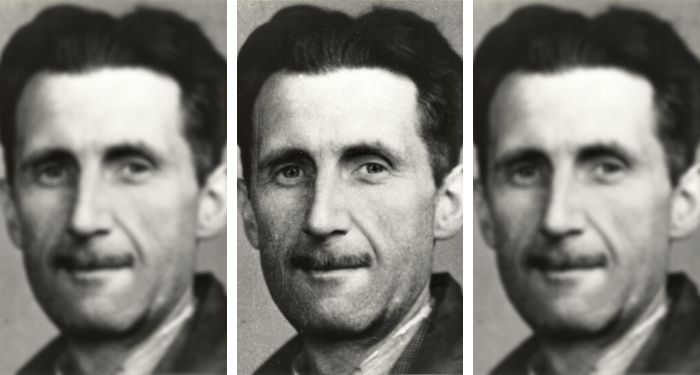You’ve likely heard of the dystopian novel 1984 and maybe even Animal Farm. Sure, you might have known the author was British writer George Orwell, but maybe you’ve asked: Who was George Orwell, actually? In this article, we’ll explore George Orwell’s life and work so you have all the facts about this important and influential author.
When Was George Orwell Born?
Orwell was born with the name Eric Arthur Blar on June 25, 1903 in Motihari, Bengal, in British India. Orwell considered his beginning humble, even though his paternal great grandfather was wealthy and owned Jamaican plantations. His grandfather was an Anglican clergyman, and his father worked in the Opium Department of the Indian Civil Service. Orwell had a sister, Marjorie, who was five years older than him, and another sister, Avril, who was five years his junior. Orwell’s mother was French and moved Orwell and Marjorie to England.
Where Was George Orwell Educated?
Orwell’s family was too poor to send him to public school, but he obtained a scholarship to St. Cyprian’s School, Eastbourne, in East Sussex. Orwell detested the school, which later inspired his essay “Such, Such Were the Joys,” which was published posthumously and described his time at St. Cyprian’s. Orwell began at Eton, the prestigious boarding school, in May 1917. While at Eton, Orwell published in several publications. The family was too poor to send him to college, and Orwell’s grades were not impressive, so Orwell joined the Imperial Police in Burma.
What is Animal Farm about?
George Orwell wrote the novella Animal Farm and published it in 1945. In this book, a group of farm animals execute a rebellion against their farmer, a human, and try to establish a utopian society. Unfortunately, the rebellion fails as the farm becomes a dictatorship that follows Napoleon, a pig. Orwell set to fictionalize the events that led to the Russian Revolution of 1917 and the ensuing Stalinist rule of the Soviet Union in Moscow. Orwell intended to critique Joseph Stalin and his brutal government, a position he formed during the Spanish Civil War when he fought for the POUM. In his essay “Why I Write,” Orwell expressed that Animal Farm was the first fiction book in which he consciously tried “to fuse political purpose and artistic purpose into one whole.”
What is 1984 about?
George Orwell wrote the dystopian sci-fi novel Nineteen Eighty-Four (alternately 1984) and published it in 1949. This book was Orwell’s ninth book and final work completed while he was alive. Orwell was inspired to create the dystopian regime in his novel by the authoritarian Stalinist Soviet Union and fascist Nazi Germany.
The story is set in the year 1984, when the world is in a perpetual state of war. Big Brother, a dictator, runs the totalitarian nation Airstrip One, formally known as Great Britain. Big Brother gains supporters based on a cult of personality that the Thought Police, an arm of the Party, design and enforce.
Our hero is Winston Smith, a dutiful mid-level government employee at the Ministry of Truth. Smith detests the Party and privately hopes for a rebellion, keeping an illegal diary and engaging in a relationship with Julia, his colleague. Together, they learn about the Brotherhood, a secret resistance group. When Smith attempts to contact the Brotherhood, he encounters a member of the Party operating undercover. Smith is arrested and is tortured both mentally and physically by the Ministry of Love, released after he announces that he has come to love and embrace Big Brother.
Fun Facts About George Orwell
- Orwell got arrested on purpose for drinking in London just so he could experience the prison system. Orwell was in jail for 48 hours. This experience informed his book Down and Out in Paris and London.
- Orwell spoke seven languages: English, French (taught to him by dystopian novelist Aldous Huxley), Burmese, Greek, German, Spanish, and Latin.
- Orwell shares his birthday with musician George Michael, American children’s writer Eric Carle, basketball player Willis Reed, Supreme Court Justice Sonia Sotomayer, and chef Anthony Bourdain.
- Orwell played pranks while a young student. He was expelled from one school for sending a dead rat with a birthday message to the town’s surveyor. Later, he made fun of his school’s housemaster with a song he wrote to spoof the educator. He would also reply to advertisements and string salesmen along for a laugh.
- Orwell invented several words, including groupthink, doublethink, crimethink, unperson, “Big Brother,” and “thought police.” Even his name has become a new word: “Orwellian.”
- Orwell had a steady job as a radio commentator for a BBC news radio show. Orwell worked as a propagandist spinning positive news for English audiences.
- Orwell had tattoos of small circles that he believed were little grapefruits on his knuckles while he was a police officer in India.
- Orwell was so tall at 6 feet 2 inches that he was in danger of being shot in the head as a soldier in Spain. He was shot in the throat in 1937 and recovered.
- Orwell had many farm animals in his home, including a goat named Muriel. In Orwell’s Animal Farm, there is a goat character, Muriel, who is one of the more intelligent and likable animals in the novel.
- Orwell coined the term “Cold War” in an 1945 essay “You and the Atom Bomb.”
What Is George Orwell’s Legacy?
Undoubtedly, George Orwell has had a lasting impact on literature. Nineteen Eighty-Four remains relevant and widely read today. In fact, in January 2017, Nineteen Eight-Four sold out on Amazon as more people faced a reality that was eerily similar to Orwell’s visionary picture of a dystopian future. Terms Orwell introduced like “thought police” and “Big Brother” have become household words. Orwell’s novels are frequently taught in high school, and remain beloved texts even today. In this way, Orwell’s legacy lives on.
